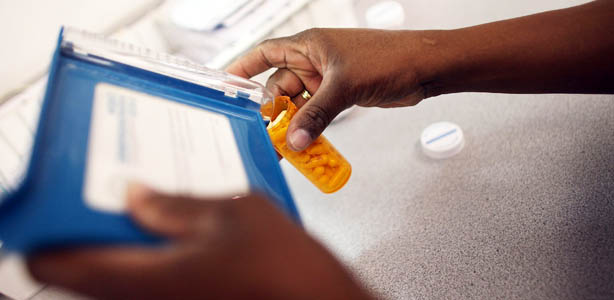From Sleeping Tablets To Viagra Clones, You Can Get Them A Lot Cheaper
PLANNING a trip abroad and wondering what to take as presents for your friends over there? Forget the saris, the silver, the snacks. You could just visit your chemist instead. Savvy travellers, whether Indians going abroad or foreigners visiting here, have realised that there’s a whole range of medical products that are relatively cheap and much more easily available in India that make very welcome presents abroad. ‘Lifestyle’ drugs for conditions like erectile dysfunction or hair loss lead the list, but it also includes more basic products like contact lenses and contact lens fluids. David, a British businessman who regularly visits India, first heard about the easy availability of prescription drugs from a friend in Goa. His friend was referring to sleeping pills, but David, always on the look out for a bargain, immediately thought of Viagra. “In London you can only buy Viagra with a prescription, and they cost at least £10 a tablet,” he says. On the Internet you can buy generic versions of doubtful legality for around £2.50 a tablet.

In Mumbai, David went to a chemist’s shop and bought 10 boxes of every brand of Viagra-type product that was available. No demand for a prescription was made. “In India the best-known brand, Kamagra, costs Rs 128 for 4 tablets but I get it for Rs 90 if I buy 20 boxes,” says David. “So that makes a Viagra tablet in London 35 times more expensive and you have to go see a doctor.” Even the internet version is around nine times more expensive. As David points out, that makes the Indian Viagra clones, “not a lot more expensive than chewing gum, but a lot more effective at 5 am.” Pharma cos shocked by easy availability of pills.
MEDICAL products — from ‘lifestyle’ drugs for conditions like erectile dysfunction or hair loss to basic products like contact lenses and contact lens fluids — are becoming the best gifts for friends abroad.
British businessman David bought Indian clones of Viagra for friends in his home country. David is quick to clarify he didn’t want the pills for himself: “I tried half a tablet once and got a splitting headache the following day. I am not going to use them until I need them.” He got them more as a joke to give out at a friend’s birthday party, wrapped up in nice paper. “We all thought it was a laugh, but some people quietly came back asking for more.” Now on visits to India, David stocks up on the Viagra clones. “I have bought them in four pharmacies in Mumbai and I have never been asked for a prescription,” he says. He is now looking for Kamagra gel, the latest fad in the UK and apparently made in India. “But it seems it gets exported at once. I haven’t been able to find any,” he complains.
Other pharmaceutical products have been easier. David buys Diazepam, the sleeping pills known as Valium abroad and Calmpose in India. “These are very popular and I get orders whenever I go. Extremely cheap compared to UK,” he says. But the biggest bargain he’s found is Propecia, a cosmetic drug used hair loss. “I confess to be a user myself,” says David. In India Cipla sells a similar product under the name Finpecia and the cost difference is startling. “They cost Rs 14 for 10 tablets, while in the UK they are 1.70 per tablet, so they are 98 times cheaper in India. For me that’s the biggest bargain,” says David.
David isn’t alone. Vijay is a doctor from India, now working in the US, who picks up Viagra type drugs which, conveniently, he’s legally entitled to prescribe over here. “I pick up an amount justifiable by a single person’s prescription for a reasonable time frame,” he says. He finds enthusiastic takers for the pills, ranging in age from 22 to 50. “My benevolence extends to the most needy!” he jokes.
The cost difference of around 10 times is the biggest attraction, he agrees, plus the fact that medical insurance plans often do not allow for Viagra. “I know that it is quite common to do this, especially with my Indian doctor friends, and some non-doctors too — since it is sold over the counter in India,” says Vijay.
Jignesh is a graduate student who’s soon leaving to start a college programme in the US. As a long-term sufferer from depression he’s got legitimate prescriptions for several psychotropic medicines for himself. But he’s not averse to taking a few extra strips for friends. Alprazolam, a popular antianxiety medicine sold under the name Xanax abroad, and under names like Restyl and Alprax in India, is one that’s popular. The sleeping medication Zolpidem, sold as Ambien abroad and under names like Sobrium in India, is another.
More than the cost, it’s the ease of buying that makes these attractive. “With Xanax in theUS you sometimes need not one, but two doctors’ prescriptions and they need to be confirmed by the pharmacists,” says Jignesh. In India, recent government regulations have made psychotropic drugs like these harder to buy, but it’s still a lot easier. Jignesh has a relative, a doctor, from whose clinic he can easily procure prescription pads. “No one is going to double check over here,” he says.
All these buyers emphasise that their purchases are relatively small and shouldn’t be equated with drug smuggling since they aren’t reselling them, but passing them on as presents. David says that he’s heard from aircrew, always the best source of information on these sort of transnational bargains, that Ketamine, used as a veterinary anaesthetic, is easily available in liquid form in India. “Once in the UK, they dry it into a powder and it’s a very popular recreational drug here,” he says, but adds that he has never done this.
For their part, pharmaceutical companies say they are shocked to hear that anyone might be buying drugs without prescriptions, whether for themselves or friends. “We only promote these drugs to a panel of doctors and we have no knowledge of nonprescription use of them,” says an official with Zydus Cadila, which makes Penegra, a similar drug to Viagra. “We would certainly discourage such non-prescription use,” agrees Raghu Kochar, spokesperson for Ranbaxy, which makes a generic version of Cialis, an erectile-dysfunction drug. Taking such products without appropriate medical guidance can be highly dangerous, says Kochar.
Nonetheless, Kochar does add that if this is happening, he’s not entirely surprised. “The appeal of such generic products is because the brand name drugs are so highly priced in the West,” he says. “The US spends 14% of its GDP in this area and people often can’t get access to therapy because of these prices.” That’s the rationale for generics that Indian companies have long been advancing, and the tourist purchasers are one more confirmation for that.
As a businessman, David finds this argument convincing: “We all believe in free trade, don’t we? The UK is well known to be the biggest rip-off on earth. Drugs made here are 40% cheaper in France and Spain,” he says. Propecia, he points out, started life as a cheap drug to treat prostate cancer, but when pharmaceutical companies realised its value against hair loss, they marketed it at 10 times the price. “When the pharmaceutical companies start charging reasonable prices, we will buy from them,” he says.
David says he even buys the Western companies’ argument that higher costs subsidise research expenses: “I agree that it’s not fair that Indian companies make money on the back of Western ones who invested millions in research.” But there has to be a balance and 1.70 a tablet for Propecia that costs Rs 1.40 in India isn’t a balance, he says feelingly, no doubt thinking of his thinning hair. Perhaps it’s too soon for Indian pharmaceutical companies to set up special duty-free stores at Indian airports, but with customers like David it looks like pharmaceutical gifting might just be trend that’s here to stay.




